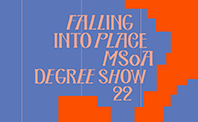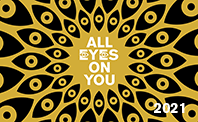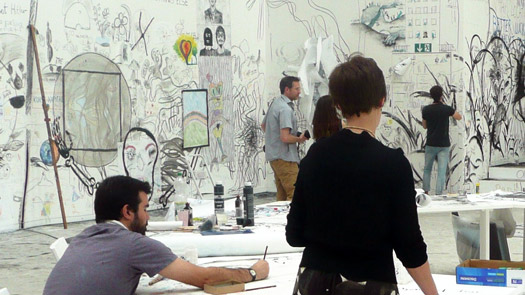Art History & Curating
Art History and Curating
4 years (with placement year and/or overseas study)
BA (Hons) Art History and Curating combines the study of art history, focusing on developments since the nineteenth century, with the essential practical skills and critical perspectives needed by the contemporary curator. And Manchester School of Art provides a distinctive, vibrant environment in which to consider art’s historical development and its relationship to society.
The course shares much of its teaching with BA (Hons) Fine Art and Art History, and students from the two courses collaborate on projects and exhibition-making. It is taught by a multidisciplinary team of practising artists, art historians, curators and theorists.
The University's exhibition spaces, cultural programmes and collections are used in the course’s teaching, providing opportunities to acquire valuable, professionally relevant experience and skills. The course also enjoys links to the city and region's galleries and arts organisations.
Special Features
- —Globally recognised: We are ranked in the top 100 schools for art and design in the world (QS World Rankings 2024).
- —Creative industry connections: The course works closely with arts institutions and galleries in Manchester and beyond, helping students to foster professional skills and contacts.
- —Collaborative working: You’ll have access to cross-disciplinary forms of collaboration, including the opportunity to take part in the Intra-actions module, with students from across the department.
- —Designated gallery space: You may have the chance to work in a designated on-site gallery, where you can collaborate with others to programme and curate throughout your course, bringing your creative ideas to life.
- —Learn from experts: You’ll focus on a fusion of critical and creative thinking as you’re taught by arts practitioners and scholars with diverse, contemporary expertise and knowledge. This includes practising artists, art historians, curators and technicians.
- —Cultural exploration: Study trips include gallery and museum visits to national and international centres.
Course Content
BA (Hons) Art History and Curating combines the study of Art between 1800 and the present day with the study of curatorial practices during the same period, together with the essential practical skills and critical perspectives necessary to the contemporary curator. The programme addresses a diverse range of artists, movements, exhibitions and display spaces as well as theoretical approaches to art history and curating.
Year 1
The first year introduces students to key skills and contexts for art history and curating. Important movements in art from Romanticism to Modernism are surveyed, placing these in their social contexts. Students also consider the contemporary contexts in which we encounter images and works of art, and the ways in which collections and exhibitions produce historical understandings.
Interactive Learning Skills and Communication
As part of your Integrated Year 1 programme, you will study an Interactive Learning Skills and Communication module. This module is designed to provide you with essential academic English and communication skills. You will engage with key concepts related to diversity, equity and inclusion; intercultural learning; sustainability; employability; and digital fluency to enhance your reading, writing, speaking, listening and ICT skills. You will gain an awareness of institutional culture, practices and expectations of higher education to prepare you as you progress from the International College to the University.
You will continue to be supported in Year 1 by the International College academic and student support team. These colleagues will deliver the Interactive Learning Skills and Communication (ILSC) module.
Art History: The Nineteenth Century and the Early Twentieth Century
The first part of the module involves an introduction to art c.1800-1900, addressing Romanticism, Realism, and Modernism in relation to modern life and modernity. It also introduces practices and concepts that are central to the discipline of art history. The second part of the module deals with the early twentieth century artistic avant-garde, examining groupings such as Cubism, Futurism, Vorticism, Constructivism, Dada, and Surrealism.
Future X: Kinship
In this module, you will explore your creative field through questions of belonging, encouraging you to consider relationships with the planet, people and place. The module functions as a Speculative Laboratory where we embrace More-Than-Human perspectives and develop new disciplinary connections to create innovative and regenerative ways of living and interacting with the world. This is an opportunity to begin to explore how creativity can be a catalyst for meaningful change.
Introduction To Art History And Curating; Encountering Art
The first half of this module has been designed to help you transition to higher education, and introduce you to the course's subject areas and their relationship to each other. It provides a grounding in academic study skills and introduces the library and other resources. The second half of the module explores how we encounter art in gallery spaces through exercises that introduce you to a number of key art institutions in the city.
Intra-actions
This module provides an opportunity to explore collaborative and interdisciplinary art and/or curatorial practice by undertaking work alongside students from other programmes in the department.
Year 2
In the second and third years students survey movements and themes in art up to the contemporary, and develop their knowledge and understanding of art's historical, theoretical, and institutional contexts. Alongside this they develop practical skills and professional perspectives relevant to curating. Students have the option to plan and realise an exhibition for a final curating project. Students will also conduct an independent research project leading to an extended piece of writing, which may be an extended essay or a full-length dissertation.
Future X: Symbiosis
In this module, you will tackle complex planetary challenges by working with students from different creative fields. Through our lab-studio-classroom, experimental approaches to practice will explore the notion of ‘What if?’ as a way to explore open-ended enquiries that allow critical space to propose alternative futures. Through multidisciplinary perspectives you'll develop innovative responses to societal issues, combining practical skills and theory to create resilient, inclusive outcomes for our changing world.
Art History 4: Interpretations
The module examines methods and theories relevant to the historical study and interpretation of art and other forms of visual culture, and looks at the place of these theories in the development of the discipline of art history.
Year 3
In the second and third years students survey movements and themes in art up to the contemporary, and develop their knowledge and understanding of art's historical, theoretical, and institutional contexts. Alongside this they develop practical skills and professional perspectives relevant to curating. Students have the option to plan and realise an exhibition for a final curating project. Students will also conduct an independent research project leading to an extended piece of writing, which may be an extended essay or a full-length dissertation.
Curating Final Project
In this module, you will work collaboratively with other students to develop and plan a thematic exhibition for a contemporary art space.
Future X: Re-worlding
In this module, you will explore the boundaries of where your discipline intersects with other fields of practice as a catalyst for innovation. You will use theory to contextualise thinking, moving beyond the silo of subject specialism, and engage in imaginative experiments to rethink traditional approaches and roles in 'the profession’. This module helps prepare you for your final year of study, setting the context for the year ahead.
Art History 6: Framings
This module will explore institutional contexts for the teaching, production, and use of art (such as the art school, the studio, patronage, the art market, the art museum). As part of this, the module will also examine historical processes of change since the Renaissance that have resulted in the transformation of the institutional structure of art.
Assessment Methods
End of unit course work assessments including: projects, essays, blogs, group work and exhibitions. Ongoing formative assessment and feedback.
Assessment Weightings & Contact Hours
10 credits equates to 100 hours of study, which is a combination of lectures, seminars and practical sessions, and independent study. A three year degree qualification typically comprises 360 credits (120 credits per year). The exact composition of your study time and assessments for the course will vary according to your option choices and style of learning, but it could be—
Study
- Year 1 25% lectures, seminars or similar; 75% independent study
- Year 2 25% lectures, seminars or similar; 75% independent study
- Year 3 100% placement (optional)
- Year 4 20% lectures, seminars or similar; 20% independent study
Assessment
- Year 1 100% coursework
- Year 2 100% coursework
- Year 3 100% placement (optional)
- Year 4 100% coursework
Student Work
Visit our online digital showcase to view the work of final year Art History and Curating students.


Staff
- Beccy Kennedy-Schtyk
Programme Leader
— - Anne-Marie Atkinson
Lecturer
— - Dena Bagi
Lecturer in Curating
— - Gulsen Bal
Senior Lecturer
Programme Leader in MA/MFA Contemporary Curating
— - Tom Clark
Lecturer
— - Rick Copsey
Senior Lecturer
— - Sara Davies
Lecturer
— - Simon Faulkner
Reader in Art History
— - Sarah James
Professor of Visual Culture
— - Gavin MacDonald
Interim Deputy Head of Department, Art and Performance
— - Elisa Oliver
Senior Lecturer
— - Matt Retallick
Senior Lecturer, Art History and Curating
— - Hannah Singleton
Senior Lecturer
— - Rebecca Smith
Lecturer
—
Graduates
The course will allow you to develop into informed, critically capable art historians and curators, able to take your place as professionals in the arts and the wider cultural industries. It will also offer you the opportunity of enhancing your employability through placement and overseas study sandwich year options.
This course is appropriate for careers in a range of cultural roles e.g. gallery/museum curator, archivist, art historian, arts manager, cultural event organiser, art writer/journalist, as well as being appropriate for postgraduate study.
Making an Application
How to Apply
Apply through UCAS.
You will be notified of our decision through UCAS.
Entry Requirements
| UCAS Tariff Points/Grades Required | 104-112. GCE A levels - grades BCC or equivalent Pearson BTEC National Extended Diploma - grade DMM Access to HE Diploma - Pass overall with a minimum 106 UCAS Tariff points UAL Level 3 Extended Diploma - grade of Merit overall OCR Cambridge Technical Extended Diploma - grade DMM T level - We welcome applications from students undertaking T level qualifications. Eligible applicants will be asked to achieve a minimum overall grade of Merit as a condition of offer IB Diploma - Pass overall with a minimum overall score of 26 or minimum 104 UCAS Tariff points from three Higher Level subjects Other Level 3 qualifications equivalent to GCE A level are also considered. A maximum of three A level-equivalent qualifications will be accepted towards meeting the UCAS tariff requirement. AS levels, or qualifications equivalent to AS level, are not accepted. The Extended Project qualification (EPQ) may be accepted towards entry, in conjunction with two A-level equivalent qualifications. Please contact the University directly if you are unsure whether you meet the minimum entry requirements for the course. |
|---|---|
| Specific GCSE Requirements | GCSE grade C/4 in English Language or equivalent, e.g. Pass in Level 2 Functional Skills English |
| International Baccalaureate | IB Diploma with minimum 26 points overall or 104 UCAS Tariff points from three Higher Level subjects. If you plan to meet the Level 2 course requirements through your IB Diploma you will need to achieve Higher Level 4 or Standard Level 5 in English Points |
International Students
A minimum IELTS score of 6.0 overall with no individual element below 5.5 is required.
There’s further information for international students on our international website if you’re applying with non-UK qualifications.
Tuition Fees 2026 Entry
UK and Channel Island students
Full-time fee: £9,790 for the 2026/27 academic year*. £10,050 for the 2027/28 academic year*. Fees for subsequent academic years may increase for inflation to reflect increased costs of course delivery (up to a maximum of 10% per academic year) and/or changes in UK government regulation. Inflationary increases will be calculated by reference to RPIx (RPIx is a measure of inflation in the UK). Fee increases are subject to limits imposed by UK government regulation.
Find out about the extra support we may be able to provide with our scholarships for UK students.
EU and non-EU international students
Full-time fee: £21,500 per year. Tuition fees will remain the same for each year of your course, providing you complete it in the normal timeframe (eg no repeat years or breaks in study).
Many of our international students are eligible for a discount on their tuition fees. Visit our scholarships and funding pages to find out what's available for you.
Additional information
A degree typically comprises 360 credits, a DipHE 240 credits, a CertHE 120 credits, and an integrated masters 480 credits. For courses that offer a placement year option the tuition fee for the placement year in 2027/28 is £2,010*. For courses that offer a study year abroad option the tuition fee for the study year abroad in 2027/28 is £1,505*. Placement year fees and study abroad fees for subsequent academic years may increase for inflation to reflect increased costs of course delivery (up to a maximum of 10% each academic year) and/or changes in UK government regulation. Inflationary increases will be calculated by reference to RPIx (RPIx is a measure of inflation in the UK). Fee increases are subject to limits imposed by UK government regulation.
* Subject to Parliamentary approval.
See Funding your studies for further information and advice.
Additional Costs
Specialist Costs
Optional £500* — Students often choose to buy their own laptop in their first year (costs approximately £200-£800). However there are computer facilities on campus.
Trips and Placement Costs
Optional £1,140* — Educational visits to European centres during each year. These are optional and if related to a unit of study, local alternatives are identified.
Professional Costs
There are no additional professional membership fees required for full qualification.
Other Costs
£150* plus optional £300* — Books and digitised readings are available from the library. However, you will be required to purchase a small number of core books. There will also be some costs associated with printing (core and optional). Materials (core and optional) relating to the practice of curating and the staging exhibitions.
* All amounts shown are estimates.
